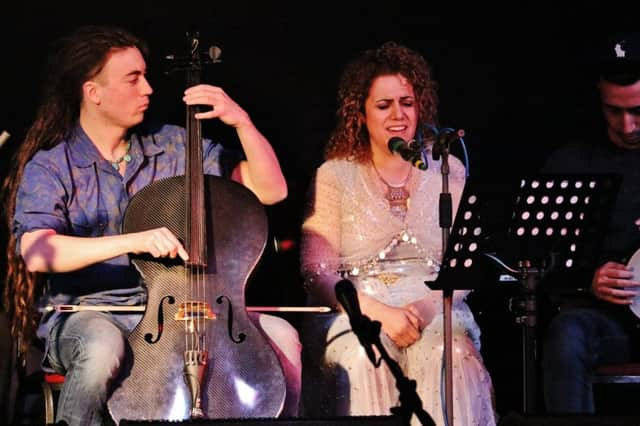Glasgow-based refugees overcome their language barriers to form musical band


Music is part of the reason that the 44-year-old Iranian singer and keyboardist found himself here, in a makeshift rehearsal room overlooking a busy Glasgow street, thousands of miles from home.
He fled his country three years ago, not only because he feared persecution after changing his religion, but because the kind of music he was making was banned by authorities.
Advertisement
Hide AdAdvertisement
Hide AdKarimi is one of the members of Musicians In Exile, perhaps the UK’s most unorthodox ensemble. Formed less than a year ago, it is made up entirely of asylum seekers and refugees.
Every week the group meets in Govan in the south west of the city, writing new songs and performing them in public despite the barriers posed by their different cultures and languages.
“Music is an international language. It doesn’t matter if you speak English or African, if you listen to the music, you know,” says Karimi, who has been a musician for 20 years.
“Most of the musicians come from the Middle East, so all of the songs are about love,” he adds with a smile. “It’s the most important thing in the world, and it’s the reason musicians write songs.”
Like most of the other members of the group, Karimi did not have an instrument when he joined. His new keyboard, specifically tuned to play Middle Eastern music, was imported from Holland.
Tracking down instruments is the job of project manager Paul MacAlindin, who spends hours scouring the internet for obscure items most people would not even recognise.
“I would go online, usually to eBay, sometimes to Amazon, and scroll through and say ‘Is that the one you want?’, having never heard of this instrument before in my life,” he says.
MacAlindin finds new band members by distributing flyers in Kurdish, Arabic and Farsi and telling organisations which have regular contact with asylum seekers and refugees, such as the Red Cross.
Advertisement
Hide AdAdvertisement
Hide AdHe says the group helps its members hang on to their cultural identities, adding that they are often “doubly shocked” by the situation they have left at home and adjusting to life in a new country.
“I don’t care where these people come from, I care that they just want to make music,” he says. “It’s a mental health thing, it’s about helping them recover their intrinsic cultures and build new connections in their new society.
“It’s also about helping them give back to the communities, because asylum seekers are legally forbidden to work, so they’re very limited in what they can do to engage with society. The obvious thing to do for a musician is put on a gig.”
The beauty of the project, he adds, is that the type of music created is “entirely at the mercy of who happens to walk through the door”, with new refugees joining all the time.
As if on cue, a trio of El Salvadorans enters from the rainy street outside. Within minutes they have been welcomed in, handed a guitar and a ukelele and taught the basics of the band’s latest song.
One of them is Gerardo Cruz, 24, who arrived in the UK in April with his three brothers, mother and her partner. He found out about the project through an advert in a charity shop. “In my country we don’t listen to this kind of music, so it’s a new experience for us,” he says.
Musicians in Exile are performing as part of the Refugee Festival Scotland on 30 June at the Grand Ole Opry in Glasgow.